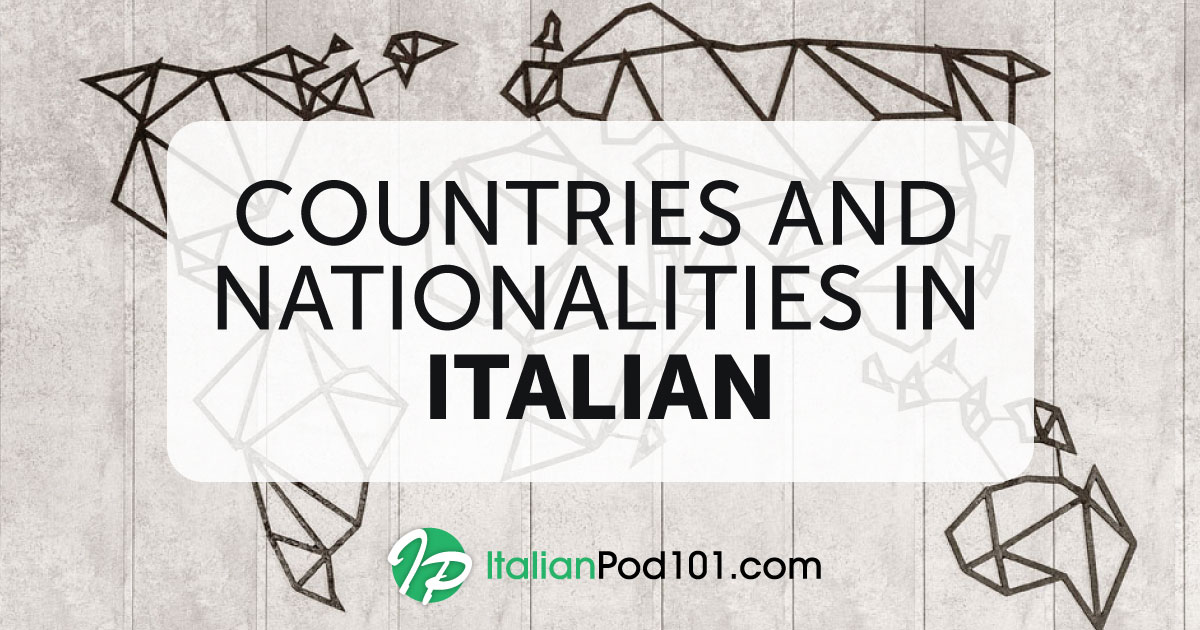
Time to study Italian animal words!
Why?
Animals are beautiful, animals are funny, and animals are useful. In addition, they are a common conversation topic (think of pets, documentaries, and films with animals in them). But do you really need a reason to study animal words in Italian?
Animal words are something that Italian children learn very early on when they first start speaking, and they’re equally essential for language learners to study—no matter their age. And, conveniently enough, many common animal names are similar across languages. Take, for example:
- Elephant
- Lion
- Tiger
- Giraffe
- Panda
- Koala
- Kangaroo
- Panther
- Gorilla
Do you want to give it a try and say the names of these animals in Italian? In any case, keep reading to find the answers!
In this article, you’ll learn the names of animals native to Italy as well as those found abroad. We’ll cover wild animals, farm animals, zoo animals, sea animals, bugs, birds, and even different types of pets. You’ll also discover fun expressions related to animals and the Italian terms for animal body parts. Ready?
 Table of Contents
Table of Contents
- Pets
- Farm Animals
- Wild Animals
- Marine Animals
- Bugs and Insects
- Birds
- Reptiles & Amphibians
- Animal Body Parts
- Animal Verbs
- Animal Sounds
- Animal-Related Idioms and Slang Expressions
- Conclusion
1. Pets
There are around 60 million pets in Italy today, equating to almost one pet per Italian! You could definitely say that Italians love their pets.
The most common pet choices here are dogs and cats (no surprise there), with Italians owning a total of seven million of each! Other popular pets among Italians of all ages are birds, fish, little mammals (hamsters and rabbits), as well as reptiles and spiders!
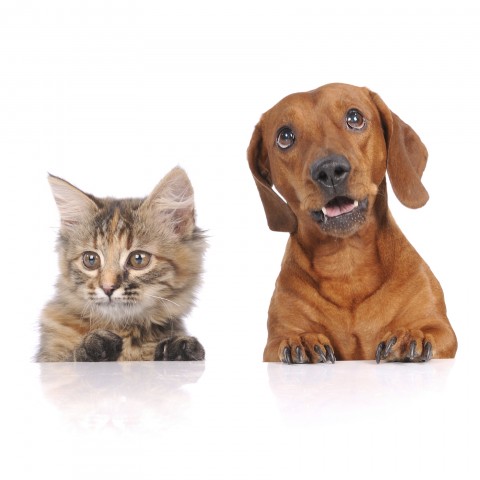
Best friends forever!
Pets are not only a source of companionship and stress relief for people, but they’re also good for the economy! It’s calculated that the pet industry moves more than two billion euros per year, and it’s a constantly growing business.
Here are the names of animals in Italian that are most often kept as pets:
| (Il) gatto | “Cat” |
| (Il) cane | “Dog” |
| (Il) criceto | “Hamster” |
| (Il) coniglio | “Rabbit” |
| (Il) canarino | “Canary” |
| (Il) porcellino d’India | “Guinea pig” |
| (Il) pesce rosso | “Goldfish” |
→ Check out our big list of animal names, and practice your pronunciation with the help of recordings from native speakers.
2. Farm Animals
Before fashion, art, and sports cars, Italy was mainly an agricultural economy. As such, farm animals have always played a central role in the lives and culture of Italians. Take a local train out of any Italian city, and you’ll be able to spot beautiful and happy farm animals scattered throughout the Italian landscape.
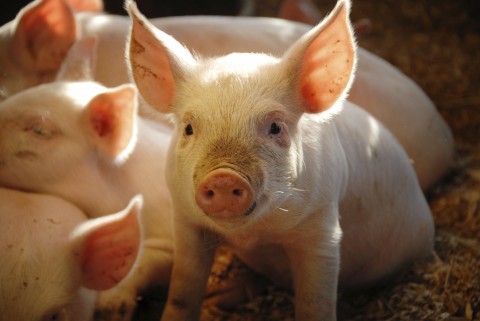
Sono un porcellino. (“I’m a piglet.”)
Granted, they may not be happy all the time, given the general conditions of intensive farming. But numbers do show that the consumption of meat in Italy has decreased over the last decade, especially when it comes to red meat (for health issues) and meat from horses, rabbits, and lambs (due to a growing sensitivity toward these species).
Some breeding animals are more important than others, since they’re vital in the creation of some of the most widely known Italian culinary products: mozzarella di bufala (“buffalo mozzarella”), prosciutto di Parma (made from select pigs), and formaggio pecorino (“sheep milk cheese”).
Here are the names of common farm animals in Italian:
| (La) mucca | “Cow” |
| (Il) cavallo | “Horse” |
| (L’)asino | “Donkey” |
| (Il) mulo | “Mule” |
| (La) pecora | “Sheep” |
| (La) capra | “Goat” |
| (La) gallina | “Hen” |
| (Il) gallo | “Rooster” |
| (Il) tacchino | “Turkey” |
| (Il) maiale | “Pig” |
3. Wild Animals
Italy has the highest biodiversity of any country in Europe, with over 57,000 different animal species (or more than a third of all European fauna).
This is due to various factors.
The Italian Peninsula is at the center of the Mediterranean Sea, forming a corridor between Central Europe and North Africa; its coastline is 8,000 kilometers (≈ 4971 miles) long. Animals also tend to arrive in Italy from the Balkans and the Middle East. And finally, the geological structure of Italy is quite varied and its climate differs from North to South. All of this contributes to creating a great habitat diversity.
As a result, Italy is home to many beautiful wild land animals, mostly in the woods and in the mountains. In the recent past, many of these animals were in danger of extinction from Italian territory, mostly due to hunting and the loss of their natural habitat. But lately, thanks to protection laws and information campaigns, they’re starting to increase in number.
Keep reading to discover the names of several different wild animals in Italian!
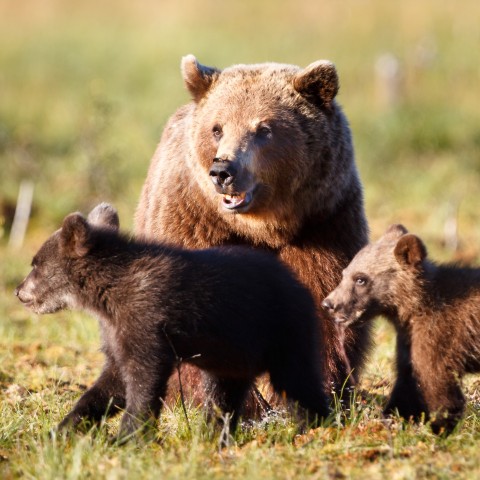
A happy family
| (L’)orso | “Bear” |
| (Il) lupo | “Wolf” |
| (Il) cervo | “Deer” |
| (Lo) stambecco | “Steinbock” (Alpine wild goat) |
| (La) volpe | “Fox” |
| (La) lepre | “Hare” |
| (Il) cinghiale | “Wild boar” |
| (Lo) scoiattolo | “Squirrel” |
| (La) vipera | “Viper” |
If these aren’t enough, you might want to spend a day in a zoo (check out one of the oldest and largest zoos in Europe, Roma’s Bioparco). Here are the names of wild animals you’ll find there:
| (Il) leone | “Lion” |
| (La) tigre | “Tiger” |
| (La) giraffa | “Giraffe” |
| (L’)ippopotamo | “Hippopotamus” |
| (Il) rinoceronte | “Rhino” |
| (Il) gorilla | “Gorilla” |
| (L’)elefante | “Elephant” |
| (Il) canguro | “Kangaroo” |
| (Il) panda | “Panda” |
| (Il) koala | “Koala” |
| (La) pantera | “Panther” |
| (La) scimmia | “Monkey” |
| (Il) bradipo | “Sloth” |
| (Il) pinguino | “Penguin” |
| (L’)orso polare | “Polar bear” |
| (La) foca | “Seal” |
4. Marine Animals
Italy is a peninsula surrounded by the beautiful Mediterranean Sea, and Italians have always been exploring its waters for adventure and fishing. So, we love fish…and the beach, too!
There are many common species of fish in the Mediterranean, especially of the type pesce azzurro (“oily fish”). These include tonno (“tuna”), sgombro (“mackerel”), pesce spada (“swordfish”), and sardina (“sardine”). We also have plenty of seafood, like ricci (“sea urchins”), vongole (“clams”), and cozze (“mussels”).
Below, you’ll find the names of the most common sea animals in Italian. But if you want to see and practice the names of larger or more exotic aquatic species, you should go to the fantastic Aquarium of Genova.
| (Il) pesce | “Fish” |
| (Lo) squalo | “Shark” |
| (Il) delfino | “Dolphin” |
| (La) balena | “Whale” |
| (Il) leone marino | “Sealion” |
| (La) medusa | “Jellyfish” |
| (Il) cavalluccio marino | “Seahorse” |
| (Il) riccio | “Urchin” |
| (La) stella di mare | “Starfish” |
| (La) cozza | “Mussel” |
| (Il) polipo | “Octopus” |
→ Do you want to take a plunge with more marine animals and fish? Check out our fun vocabulary list!
5. Bugs and Insects
In the countryside, in the cities…the planet is full of insects. And maybe one day they will indeed inherit the world! Until then, let’s review the most common insects and other creepy-crawlies (hoping that no one here suffers from insectophobia!).
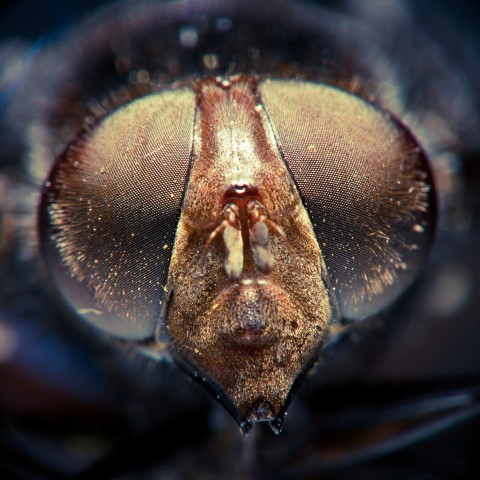
Don’t you like me?
But, on the other hand, if you’re among those who think that insects and bugs will be the food of the future, be advised that Italian law still prohibits the commercialization of edible bugs and derivatives (such as bug flour). So, if you have that particular craving, the only solution would be online stores.
Anyway, on with the list…
| (La) mosca | “Fly” |
| (Il) moscerino | “Gnat” |
| (La) zanzara | “Mosquito” |
| (Lo) scarafaggio | “Cockroach” |
| (La) formica | “Ant” |
| (La) farfalla | “Butterfly” |
| (La) libellula | “Dragonfly” |
| (L’)ape | “Bee” |
| (La) vespa | “Wasp” |
| (Il) ragno | “Spider” |
| (Il) grillo | “Cricket” |
| (La) coccinella | “Ladybug” |
6. Birds
In Italy, there are more than 500 species of birds. Half of these are nesting birds, while the other half are just passing by.
Birds have traditionally been a favorite target of hunters, and for this reason, they’re in great need of protection by organizations such as the Lega Italiana Protezione Uccelli – LIPU (“Italian Bird Protection League”). They do a great job at protecting birds, defending nature, and promoting knowledge of and respect for the environment.
| (La) colomba | “Dove” |
| (Il) piccione | “Pigeon” |
| (Il) passero | “Sparrow” |
| (Il) corvo | “Crow” |
| (Il) gabbiano | “Seagull” |
| (Il) falco | “Hawk” |
| (L’)aquila | “Eagle” |
| (La) civetta | “Owl” |
| (Il) pavone | “Peacock” |
7. Reptiles & Amphibians
You might never expect to see exotic or dangerous reptiles while traveling through Italy, but there are many varieties of lizards, turtles, and even a few poisonous vipers, so… Attenti dove mettete i piedi! (“Watch your step!”)
If you want to learn more about what to look for and what to avoid, i Carabinieri has published an exhaustive page on the topic.
| (La) rana | “Frog” |
| (Il) rospo | “Toad” |
| (La) tartaruga | “Turtle” |
| (Il) serpente | “Snake” |
| (La) lucertola | “Lizard” |
| (La) salamandra | “Salamander” |
| (L’)iguana | “Iguana” |
| (Il) coccodrillo | “Crocodile” |
8. Animal Body Parts
Even if we all evolved from the same little amphibians millions of years ago, we have different names for the body parts of humans and animals. And you’d better avoid mixing them up!
Learning the following words will help a lot when it comes to describing animals in Italian.
| (Il) muso | “Muzzle” |
| (Il) becco | “Beak” |
| (La) zampa | “Paw” |
| (La) coda | “Tail” |
| (Le) corna | “Horns” |
| (Il) pelo | “Hair” |
| (La) pelliccia | “Fur” |
| (Le) zanne | “Fangs” |
| (Gli) artigli | “Claws” |
| (Lo) zoccolo | “Hoof” |
| (La) penna | “Feather” |
| (La) piuma | “Plume” |
| (La) criniera | “Mane” |
| (La) proboscide | “Trunk” |
| (Il) tentacolo | “Tentacle” |
| (L’)antenna | “Antenna” |
| (Le) pinne | “Fins” |
| (Le) scaglie | “Scales” |
| (La) cresta | “Comb” |
→ Are you getting confused between human and animal body parts? Here’s a link to freshen up your “human” vocabulary.
9. Animal Verbs
Are you having fun yet? We thought so.
To complement your knowledge of animal names and body parts, let’s go over a few essential verbs you’ll need to talk about animal-related actions.
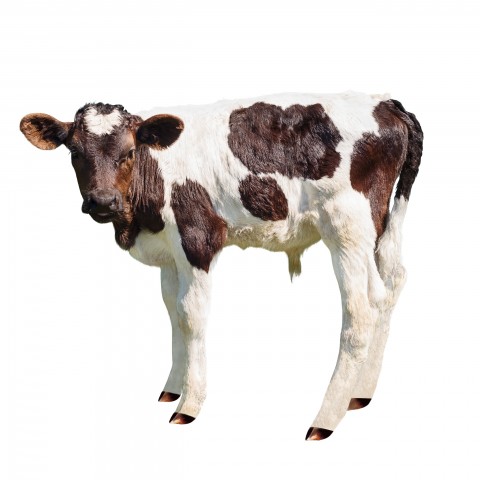
In Italian, I go Muuuuu.
| Miagolare | “To meow” |
| Abbaiare | “To bark” |
| Ruggire | “To roar” |
| Ronzare | “To buzz” |
| Ringhiare | “To growl” |
| Fare le fusa | “To purr” |
| Cinguettare | “To chirp” |
| Muggire | “To moo” |
| Galoppare | “To gallop” |
| Nuotare | “To swim” |
| Strisciare | “To crawl” |
| Azzannare | “To bite (with teeth)” |
| Beccare | “To peck” |
| Graffiare | “To scratch” |
| Leccare | “To lick” |
| Accarezzare | “To pet” |
| Addestrare | “To tame” / “To train” |
| Allevare | “To breed” |
| Accoppiare | “To mate” |
10. Animal Sounds
Animals do not emit generic noises, but calls that have very precise names. Some of these onomatopoeia are commonly used, while others are less well-known. After learning the sounds animals make in Italian, try to see which ones you’re able to imitate!
| Animal | Sound | Verb |
| cane (“dog”) | bau bau | abbaia (“it barks”) |
| gatto (“cat”) | miao | miagola (“it meows”) |
| asino (“donkey”) | Iho iho | raglia (“it brays”) |
| cavallo (“horse”) | iiih | nitrisce (“it neighs”) |
| elefante (“elephant”) | iiiih | barrisce (“it trumpets”) |
| gallo (“cock”) | chicchirichì | canta (“it sings”) |
| zanzara (“mosquito”) | zzzzzzz | ronza (“it buzzes”) |
| corvo (“crow”) | cra cra | gracchia (“it croaks”) |
| topo (“mouse”) | squit squit | squittisce (“it squeaks”) |
| serpente (“snake”) | sssssss | sibila (“it hisses”) |
| rana (“frog”) | cra cra | gracida (“it croaks”) |
| pulcino (“chick”) | pio pio | pigola (“it peeps”) |
| piccione (“pigeon”) | gru gru | tuba (“it coos”) |
| pecora (“sheep”) | beeeee | bela (“it bleats”) |
| passero (“sparrow”) | cip cip | cinguetta (“it chirps”) |
| mucca (“cow”) | muuuuu | muggisce (“it bellows”) |
| maiale (“pig”) | oink oink | grugnisce (“it grunts”) |
| lupo (“wolf”) | auuuuhhh | ulula (“it howls”) |
| grillo (“cricket”) | cri cri | frinisce (“it chirps”) |
And the crocodile…? What does the crocodile say? Nobody knows. But if you want to have a little fun, here’s one of the most famous Italian children’s songs, named Il coccodrillo come fa? (“How Does the Crocodile Go?”)
11. Animal-Related Idioms and Slang Expressions
Animals are an integral part of our daily lives, so much so that we find them in many common proverbs, expressions, and idioms in the Italian language.
We often use expressions where animals are associated with personal qualities in order to highlight these qualities more effectively, or to metaphorically represent some characteristics or traits of people.
Expressions with animals are so numerous and so pervasive that it would be impossible to make an exhaustive list. But here are the most common ones. What can I say? In bocca al lupo! (You’ll need to get to the end to know what that means…) 😉
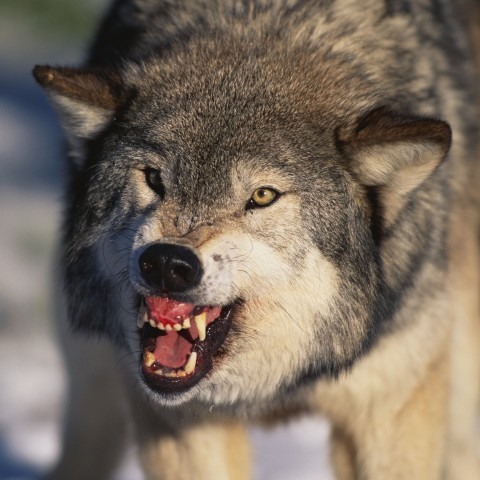
In bocca al lupo – Viva il lupo!
| Italian expression | Il lupo perde il pelo ma non il vizio. |
| Literal translation | “The wolf loses its fur but not its vice.” |
| It’s very difficult to eliminate bad habits, though some people struggle with it more than others. This expression is roughly equivalent to the English “A leopard never changes its spots.” Wolves have a special place in Italian culture, and you can find more than a few expressions mentioning these wonderful wild dogs…such as the next one! | |
| Italian expression | Avere una fame da lupo |
| Literal translation | “To be hungry as a wolf” |
| The poor wolves have become a symbol of greed and hunger, not to mention arrogance and force. We use this expression to mean that one is starving and could eat a cow… It is similar to the expression “I’m as hungry as a wolf,” in English. | |
| Italian expression | Mettere la pulce nell’orecchio |
| Literal translation | “To put the flea in the ear” |
| It basically means that you’re giving something to someone (usually a piece of information) in order to instill a doubt or a fear, or to cause some kind of annoyance. Because let’s face it: a flea in your ear would definitely grab your attention. This expression can roughly be translated as: “to plant a seed of doubt.” | |
| Italian expression | Prendere qualcuno a pesci in faccia |
| Literal translation | “To throw fish at someone’s face” |
| This means to treat someone very rudely, with total disrespect. But why would you show disrespect by throwing smelly fish at someone? Apparently, it’s a Nordic habit that was common among the Vikings; it was made famous in Italy not so long ago via the Asterix comic books! A rough English equivalent would be: “to treat someone like dirt.” | |
| Italian expression | Non sapere che pesci pigliare |
| Literal translation | “Not knowing what fish to choose” |
| This is an expression used to signify that you’re totally undecided about something, and cannot make up your mind over this or that. My guess is that it originates from the great variety of fish available in an Italian pescheria (“fish market”). In English, you would use the expression: “to not know which way to turn.” | |
| Italian expression | Essere un pesce fuor d’acqua |
| Literal translation | “To be a fish out of water” |
| This expression indicates the state of being outside of your usual environment, especially if you feel uneasy, shy, or embarrassed. I would say it’s rather self-explanatory. You try to be a fish out of water…and then you tell me how you feel! | |
| Italian expression | Andare a letto con le galline |
| Literal translation | “To go to bed with the hens” |
| You don’t need to be living on a farm to know that the hens (and the rooster) are the first to wake up and the first to go to sleep. An English equivalent might be: “to get up with the chickens.” | |
| Italian expression | Fare la fine del topo |
| Literal translation | “To end up like a mouse” |
| Mice don’t have it easy in life… Cats try to catch and eat them. Humans try to kill them with poison or traps. At best, they’re thrown in a cage and used for experiments. So, obviously, ending up like a mouse means that you’re trapped with no way out. | |
| Italian expression | Essere un asino |
| Literal translation | “To be an ass” |
| In English, being an ass means that you’re basically an idiot. But in Italian, to call someone this means to call them ignorant, especially in the sense that they’re a bad student at school. Do you remember the scene in Pinocchio, where he and his friends were all turned into donkeys because they refused to go to school? Well, there it was taken rather literally. | |
| Italian expression | Essere un cane |
| Literal translation | “To be a dog” |
| This one has a different meaning than its English equivalent. It means to be really bad at something, especially when acting or performing. This is another case of referring to an animal in order to describe a human characteristic. You could use it in a sentence like this: Quell’attore è bello, ma a recitare è un cane. (“That actor is handsome, but as an actor he’s really bad.”) | |
| Italian expression | Essere un’oca |
| Literal translation | “To be a goose” |
| For some reason, Italians use the goose as a symbol of clumsiness and of disconcerting superficiality, usually in reference to a girl or woman. | |
| Italian expression | Essere testardo come un mulo |
| Literal translation | “To be stubborn as a mule” |
| The mule is a hybrid animal, crossbred between a donkey and a mare. This animal is known for its resistance to fatigue, thanks to which it has been bred since ancient times in order to help humans with labor and transportation. But another quality mules are known for is their stubbornness; apparently, once a mule decides to stop, there is no way to convince it otherwise. | |
| Italian expression | Non sentire volare una mosca |
| Literal translation | “Not hearing a fly fly” |
| There is absolute silence. Not a sound, not even that of the wings of a fly. The equivalent concept in English is expressed with “dead silence,” which might be just a bit scarier… | |
| Italian expression | Tagliare la testa al toro |
| Literal translation | “To cut the bull’s head” |
| The expression “to cut the bull’s head” figuratively means “to make a sudden and serious decision,” one that usually involves grave consequences. It’s used when someone takes control in order to solve a particular problem once and for all. In English, you would say: “Let’s just get this over with!” | |
| Italian expression | Prendere due piccioni con una fava |
| Literal translation | “To catch two pigeons with one fava bean” |
| This expression refers to obtaining more than one benefit through a single task. Fava beans were once used to lure pigeons into traps. The saying alludes to the fact that one bean could catch more than one pigeon. It means the same as “to kill two birds with one stone” in English. | |
| Italian expression | Essere in quattro gatti |
| Literal translation | “To be four cats” |
| This means to be very small in number, or for there to be few people around. This expression comes from the fact that wild cats once gathered in quite large groups, probably to protect themselves and hunt better. So if you had a group of only four animals, that was a very small group. | |
| Italian expression | Essere solo/a come un cane |
| Literal translation | “To be as lonely/alone as a dog” |
| The phrase derives from the observation that the dog is, like humans, a social animal. If you were to keep it isolated, away from its own kind (as often happens with guard dogs), it would suffer for wanting company. In English, it can be translated as “lonely as hell.” | |
| Italian expression | In bocca al lupo! |
| Literal translation | “In the mouth of the wolf!” |
| We use this expression to wish someone success in something. But an Italian would never simply say buona fortuna (“good luck”), because this actually brings bad luck! (Go figure…) Instead, we say this expression to someone before an important occasion (such as a test or job interview). This Italian expression seems to have ancient origins: It used to be a superstitious wish for hunters who went hunting in the woods. Their answer back then, as well as today, was: crepi il lupo (“that the wolf might die”). Of course, nowadays, wolves are a protected species that is slowly coming back to inhabit Italian woods and mountains, so the preferred reply is now: Viva il lupo! (“Long life to the wolf!”) | |
12. Conclusion
In this guide, you’ve learned many animal names in Italian, from pets to all kinds of reptiles and marine creatures. You’re now ready to ask your friends about their pets or discuss your favorite animals with them.
We realize that we only mentioned a small number of animals here. In case we forgot your favorite animal or you want to know more about Italian expressions with animals, make sure to mention it in the comments below!
You can also explore ItalianPod101.com and check out all of our free resources. Our vocabulary lists, in particular, are a great way to review words and practice your pronunciation. We also offer a page on the basics of Italian grammar, which is essential if you’re just starting out!
Remember that you can also use our Premium PLUS service, MyTeacher. This will give you access to personal 1-on-1 coaching with your own private teacher, who can help you practice animal words and so much more. Your teacher can also give you assignments and personalized exercises, provide you with recorded audio samples, and review your work to help you make faster progress.
Keep having fun with ItalianPod101!







